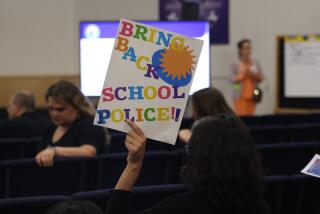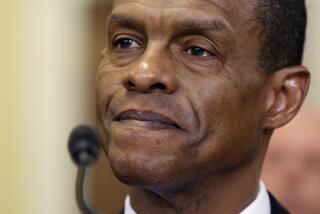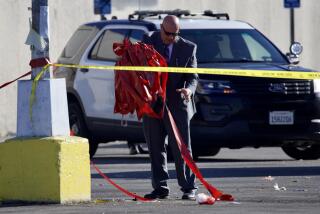Cops and Kids: Fear Fuels Cycle of Distrust : The experts: Therapists and educators say that black teens who have negative encounters with police can develop deep anger without realizing it.
- Share via
Harvard University psychiatrist Alvin F. Poussaint is still affected by his earliest contacts with police.
“Growing up in New York City, I was pushed around by police and called racial names,” said Poussaint, who is black. “Until this day--and I’m in my 50s--when I get stopped by a white policeman on a highway, I’m nervous. I worry that if I say the wrong thing or make the wrong move, they might hit me or abuse me. . . . “
“You get the feeling that they spotted you because you were black.
“They are not used to seeing black men in (new) cars and they get suspicious. Maybe they didn’t stop me (for that reason). But that doesn’t lessen my anxiety and suspicion that they did,” said Poussaint, who was among several therapists and educators contacted by The Times to discuss the relationship between police and young blacks in light of the Rodney King beating.
The experts said black teen-agers develop complex, deeply engrained attitudes toward law enforcement, especially as they react to widely publicized incidents like the March 3 police beating of King, a 25-year-old black man from Altadena.
Teen-agers often try to take situations such as the King beating in stride, saying it’s a flagrant example of police harassment common in their community, the experts said.
But the nonchalant exterior masks a deeper fear and anger so subtle that the teen-agers may not even realize it, the experts said. These emotions are so deep that teens who ignore them risk a violent reaction later on.
“Some teens may have had the experience of at least being frisked and spread-eagled by police,” said Poussaint, co-author of the 1975 book “Black Child Care.”
“So they see what happened to Rodney King as not so removed from their experience.
“But these kids are scared. And that’s why kids in these areas frequently carry their own weapons. They also take steps to avoid confrontations. They know where to go and where not to go, the high-risk areas, even in their community.”
West Los Angeles psychotherapist Don Fleming also said that a certain bravado is vital to these teen-agers.
“When you live in an environment where you can get shot driving down the street, you have to develop a certain degree of denial of how threatening things are or you couldn’t function,” said Fleming, who has published two books on the psychology of children and teen-agers.
“You have to put on a bravado. Or sometimes humor is related. You use a little joking at the terror in your life as a way of defending against the deeper feelings which are the threats to your personal being. Nobody walks away unscathed living like that. . . .”
Gail Wyatt, a professor of medical psychology at UCLA School of Medicine, said: “I don’t think youngsters can give you a reading of their level of trauma in situations like this that fully evaluates or appreciates their perceptions.”
She said teens become inured by violence they see on television, in the community and between blacks and police.
“You also have to factor in adolescence,” she said. “Young people don’t see the world like other people do. They’re not as afraid. For example, they could smoke, but they wouldn’t get cancer. You have to look beyond what they tell you and ask subtle questions to determine their beliefs.”
C. Boyd James, a professor of social psychiatry and medical history at the Charles Drew University of Medicine in Los Angeles, said research shows a high degree of anxiety toward police among young people.
James, who conducted a study of 20 gang members ages 11-18, said many view police as just another gang with more firepower.
“The gang members talk of police ransacking their pockets and stealing from them and threatening them to get off the street before they arrest them,” James said. “Those are same things gang members would do to other gang members.”
Wyatt said teen-agers also become angry because their accounts of police brutality are not always granted credibility. “If you go in and say police assaulted me, that isn’t enough. You’ve got to have another documentation.”
James said teen-agers may feel that the minority community is too diffuse and splintered to produce changes.
“They quite sensitively understand the overwhelming power of police,” James said. “Insofar as well-integrated teen-agers can grasp that, what they ask themselves is: Am I willing to take on a power that is so technically strong and ruthless that the loss of the conflict or war is nothing but inevitable?”
Lt. Michael Moulin, day watch commander at the LAPD’s 77th Street Division, denied that police harass young people. He said the city’s gang problem forces police to stop and search many young people to limit violence.
“Ninety-nine percent are good kids, but 1% are not,” Moulin said. “Trying to determine which are good ones is something you cannot do at a distance of 10 or five feet. You have to make personal contact.
“I don’t mean that you arbitrarily and capriciously stop kids, but it you have a valid reason, you do stop them.”
Young people who say they are harassed by police should understand law enforcement’s problems, Moulin said.
“First and foremost, they have to take as much interest in improving their community as we do,” he said. “It’s their schools that are being victimized. . . . The gang members are sometimes killing their fellow students.”
Wyatt said it is important for teens who believed they weren’t affected by the King beating to understand their feelings. Discussions in families, schools, churches or community centers would help, she said.
Also, she said it is imperative for teens to express their feelings through marches, protests or other activities.
“Activism breeds empowerment,” she said. “The more active you are, the more you go down to City Hall, the more you realize you can make a difference, especially when you see change.
“When you do all those things and you don’t see any change, you think there was no point and nobody cares, and that the only activity in the black community anybody pays attention to is something criminal.”
Crenshaw High School Principal Jewell Boutte said students can also resolve their anger by pursuing careers that will change their community.
“They can . . . be prepared to enter occupations which will give them the opportunity to serve their community,” she said. “That is a major decision many students have made.”
Nevertheless, there is good reason for students to sound as if they took the King beating in stride, said Spencer Eth, a child psychiatrist at Cedars-Sinai Medical Center.
“When you ask people about (the possibility of) earthquakes in Los Angeles, what’s the answer you get?” Eth said.
“It’s the same answer from these students about the Rodney King situation: ‘I can’t do anything about it. I just have to forget about it and go on with my life.’ ”
More to Read
Sign up for Essential California
The most important California stories and recommendations in your inbox every morning.
You may occasionally receive promotional content from the Los Angeles Times.













